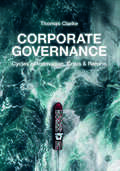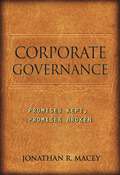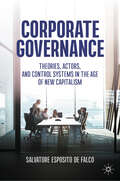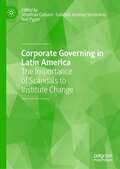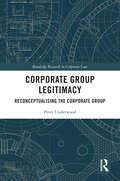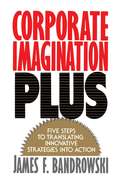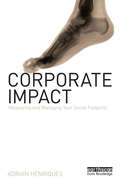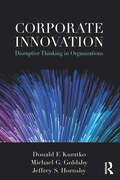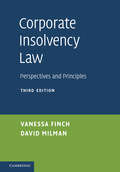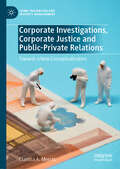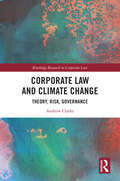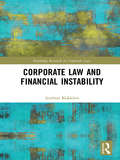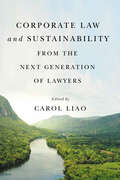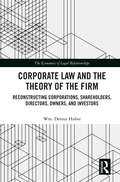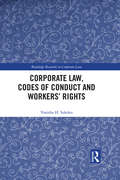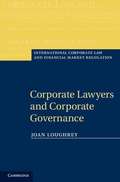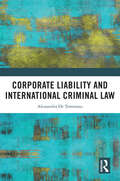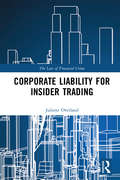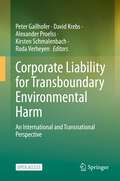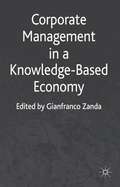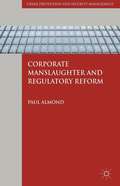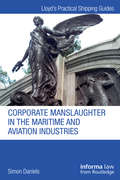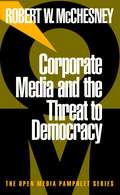- Table View
- List View
Corporate Governance: Cycles of Innovation, Crisis and Reform
by Thomas ClarkeThis critical work explores the central dynamic of industrial capitalism – the cycle of brilliant innovation, catastrophic crisis, and the painful process of corporate governance reform. Coverage includes cycles of crisis and regulation, financial bubbles, including the global financial crisis, and digital disruption. Finally, the current crisis of industry induced climate change that now imperils the world is considered. Corporate Governance: Cycles of Innovation, Crisis and Reform is essential reading for final year undergraduate and postgraduate students of Corporate Governance, International Business and Business and Management Studies. Thomas Clarke is Emeritus Professor of Management at the University of Technology, Sydney. He is a Fellow of the Royal Society of Arts (FRSA) and an international corporate governance expert.
Corporate Governance: Promises Kept, Promises Broken
by Jonathan R. MaceyEven in the wake of the biggest financial crash of the postwar era, the United States continues to rely on Securities and Exchange Commission oversight and the Sarbanes-Oxley Act, which set tougher rules for boards, management, and public accounting firms to protect the interests of shareholders. Such reliance is badly misplaced. In Corporate Governance, Jonathan Macey argues that less government regulation--not more--is what's needed to ensure that managers of public companies keep their promises to investors. Macey tells how heightened government oversight has put a stranglehold on what is the best protection against malfeasance by self-serving management: the market itself. Corporate governance, he shows, is about keeping promises to shareholders; failure to do so results in diminished investor confidence, which leads to capital flight and other dire economic consequences. Macey explains the relationship between corporate governance and the various market and nonmarket institutions and mechanisms used to control public corporations; he discusses how nonmarket corporate governance devices such as boards and whistle-blowers are highly susceptible to being co-opted by management and are generally guided more by self-interest and personal greed than by investor interests. In contrast, market-driven mechanisms such as trading and takeovers represent more reliable solutions to the problem of corporate governance. Inefficient regulations are increasingly hampering these important and truly effective corporate controls. Macey examines a variety of possible means of corporate governance, including shareholder voting, hedge funds, and private equity funds. Corporate Governance reveals why the market is the best guardian of shareholder interests.
Corporate Governance: Theories, Actors, and Control Systems in the Age of New Capitalism
by Salvatore Esposito De FalcoIn an era marked by financial scandals, corporate crises, and rapid technological advancements, this textbook equips readers with the knowledge and tools necessary to navigate the complexities of corporate governance effectively. Divided in three thematic sections, it offers a thorough examination of corporate governance theories, key actors and the systems of control essential in the current era of 'New Capitalism'. The chapters go beyond theoretical concepts, featuring numerous practical case studies drawn from real-world scenarios. Whether used as a textbook in academic settings, a reference guide in professional contexts, or a self-study resource, this textbook caters to diverse learning needs and preferences. Its organized structure and accessible language make it suitable for individuals at various stages of their academic or professional journey.
Corporate Governing in Latin America: The Importance of Scandals to Institute Change
by Neil Pyper Jonathan Callund Gonzalo Jiménez-SeminarioGrounded in institutional theories, this volume offers a framework for understanding the evolution of corporate governance in the six leading Latin American countries, namely Argentina, Brazil, Chile, Colombia, Mexico, and Peru.Applying inductive qualitative methods, it postulates the notion of governing as a dynamic, emergent and contextual process and traces its evolution and adaption to the different configurations of institutional logics in each country and the region as a whole over several decades.Adopting corporate governance scandals as the lens through which to observe institutional change in each country, this book reveals the sources of societal transformations, identifying key lessons as well as meaningful setbacks along the way.This edited collection helps appreciate the role and interactions of corporate elites, stakeholders and watchdogs, including the visible hands of government and multinational corporations, presenting comparisons across the countries, the region and the broader evolution of governing practices around the globe.The result is a book combining scholarly rigor and practical relevance, looking to serve as an emerging markets benchmark guide for practitioners, researchers and thinktanks alike.
Corporate Group Legitimacy: Reconceptualising the Corporate Group (Routledge Research in Corporate Law)
by Peter UnderwoodThis book focuses on the legitimacy of corporate power wielded by corporate groups, integrating legal doctrine, economic analysis, and theoretical approaches. It reassesses how corporate groups can maintain legitimacy whilst exercising corporate power.Corporate groups are a prominent commercial feature of many jurisdictions and present unique challenges. The book argues that when analysed through the lens of corporate social responsibility, a legitimacy deficiency emerges. This arises from a lack of historical debate, diluted control mechanisms, and inflated growth, utilising unique features of the corporate group. It explores how the magnified power of the corporate group presents acute challenges for corporate legitimacy. Data is utilised alongside current examples of corporate groups which identify structural architectural patterns. It explores new technologies such as Artificial Intelligence and blockchain as ways of attaining legitimacy. It presents methods of attaining legitimacy for the continued wielding of power to be held within corporate groups.This book spans several research interests under the corporate law umbrella. It will be of interest to traditional black letter company lawyers. Additionally, it will be of interest to those who have an interest in business and those who are interested in the role of technology.
Corporate Groups and Shadow Business Practices
by Linn Anker-SørensenThe uniqueness of this book is its conceptualization of a corporate group as a system of interaction, comprised of nodes, links and internal governance tools. This framework can be used to understand what constitutes a group, based on affiliation-linkages. By increasing our perception of group-structuring we can assess the extent to which existing laws address all variables. If the law does not consider certain variables to be used for identifying groups, a case of shadow business may be identified. Group-transparency is a recurring topic on the regulatory agenda. In this book, three legal domains are analysed questioning whether specific amendments have led to increased group-transparency: the control-definition for consolidated accounts, shareholder-transparency in company law, and major holding disclosure in listed companies. This book identifies deficiencies of the law in obtaining its regulatory objective of group-transparency, and proposes an interpretative solution based on Systems Thinking.
Corporate Imagination Plus
by Jim BandrowskiUnlock the power of creativity and innovation in strategic planning with Jim Bandrowski's transformative five-step process designed to elevate your organization at every level—perfect for readers of You&’re the Boss and Grit.This groundbreaking book was the first to explain how to incorporate creativity and innovation into strategic planning—and motivate your organization to execute new strategies enthusiastically. Pioneering and practical, this book uses hundreds of real-world examples to explain Jim Bandrowski&’s five-step Creative Planning Process. These steps are proven to help a CEO create and implement a company-wide vision or assist division and department managers in setting strategic direction for their unit. Bandrowski shows readers how to innovate in every area of their organization—marketing, new product development, manufacturing, quality, human resources, finance, and customer service—at the corporate, division, department, and project levels. Interviews with corporate executives along with extensive research reveal the creative approaches their companies are using to win, including Apple Computer, Compaq Computer, Charles Schwab, Merck, Circus Circus, General Mills, McKesson Corporation, Gensler Associates, Dolby Laboratories, and many others. Thirty techniques for conceiving strategic breakthroughs are presented along with proven approaches to launching plans, monitoring their rollout, and assuring they are successfully put into action. Conventional strategic and operational planning do little to stimulate imagination. Bandrowski presents countless ways that executives and planning facilitators can blend rigorous strategic analysis with innovative thinking. Strategy development requires creativity. Learn how to: Develop strategic insights that lead to breakthroughs. Unleash your creativity through expansive thinking. Deploy your child, adult, and parent mindsets to innovate. Transform wild ideas into feasible options and then successful strategies. Become a shrewd strategic decision maker. Formulate crystal clear strategic and operational plans. Lead and facilitate teams in achieving strategic innovations. Brand your products and services to insure they drive growth. Reinvent operations to achieve quality breakthroughs and strategically reduce costs. The book&’s concluding section on Corporate Restructuring covers Creative Corporate Planning, Acquisition Bargains, Divesture Coups, and Corporate Turnaround Strategies. If you want to Out-Think and Out-Implement your competition, this book is for you.
Corporate Impact: Measuring and Managing Your Social Footprint
by Adrian HenriquesIt is widely accepted that sustainability has an inescapable social component, but companies find it very hard to understand and measure their social impacts. Why is this? This book, by noted CSR practitioner, consultant and educator Adrian Henriques, provides the first coherent approach to identifying, understanding, measuring and accounting for corporate social impact. Beginning with an analysis of the nature of corporate social impact and the role of the stakeholder, the complex relationship of social impact to economic and environmental impacts is explored. This naturally leads to an examination of the contribution which social impact makes to business practice, profitability and ultimately to global sustainability. The second part of the book assesses the theory and practise of some of the critical measures of social impact which have been developed to date. This includes Social Return on Investment (SROI), local economic impact (LM3) and social capital as well as more established techniques. . It also explores new approaches such as 'social footprinting'. This is rounded out by presentation of a social accounting framework and how this can operate in parallel to standard financial accounting procedures. This volume provides a clear, digestible and practical roadmap for companies wishing to take responsibility for their role in society and improve their internal and external performance.
Corporate Innovation: Disruptive Thinking in Organizations
by Donald F. Kuratko Jeffrey S. Hornsby Michael G. GoldsbyEffectiveness is the underlying theme for this introduction to disruptive innovation. The book tells the manager, or student, what they need to know in transforming the thinking in an organization to an innovative mindset in the twenty-first century.Corporate Innovation explains the four stages of the innovation process, and demonstrates how to improve skills in the innovation process, and unleash personal innovative abilities. This book also presents ways to assess the organization’s attitudes toward innovation, providing insights into how to diagnose creative and innovative performance problems in the organization. Beginning with an overview of concepts involved with an innovative organization today, this book explores the fundamental aspects of the individual, the organization and the implementation. An I-Organization is a combination of: I-Skills developed within individuals I-Design thinking functions needed to shape innovation I-Teams that emerge from the HR perspective of structuring the appropriate climate I-Solution needed to provide a foundation for implementing any innovative ideas Essential reading for students of corporate innovation, corporate ventures, corporate strategy, or human resources, this book also speaks to the specific needs of active managers charged with the expectation of enhancing the innovative prowess of their organization.Instructors’ outlines, lecture slides, and a test bank round out the ancillary online resources for this title.
Corporate Insolvency Law: Perspectives and Principles
by Vanessa Finch David MilmanThe first edition of Corporate Insolvency Law proposed a fundamentally revised concept of insolvency law, intended to serve corporate as well as broader social ends. This second edition takes on board a host of changes that have subsequently reshaped insolvency law and practice, notably the consolidation of the rescue culture in the UK, the rise of the pre-packaged administration and the substantial replacement of administrative receivership with administration. It also considers the implications of recent and dramatic changes in the provision and trading of credit, the movement of an increasing amount of insolvency work to the pre-formal insolvency stage of corporate affairs and the arrival, on the insolvency scene, of a new cadre of specialists in corporate turnaround. Looking to the future, Vanessa Finch argues that changes of approach are needed if insolvency law is to develop with coherence and purpose, and she offers a framework for such an approach. "
Corporate Investigations, Corporate Justice and Public-Private Relations: Towards a New Conceptualisation (Crime Prevention and Security Management)
by Clarissa A. MeertsThis book seeks to understand the investigation and settlement of employer/employee disputes within companies. It argues that there is effectively no democratic knowledge about, or control over, corporate security, due to companies' preference for private, out-of-court settlements when faced with norm violations raised by employees. This book fills the knowledge gap by providing an overview of the corporate security sector including legal frameworks and an analysis of the role and powers of private investigative services, inhouse security, forensic accountants and forensic legal investigators. It draws on close observation, case studies and interviews with practitioners in and around the industry. Corporate Investigations, Corporate Justice and Public-Private Relations also looks at public-private relationships in this sector to propose policy remedies applicable to all corporate security providers, regardless of the disparate professional backgrounds and skill-sets of their staff.
Corporate Irresponsibility: America's Newest Export
by Lawrence E. MitchellCritique of modern business practices.
Corporate Law and Climate Change: Theory, Risk, Governance (Routledge Research in Corporate Law)
by Andrew ClarkeThis book provides an analysis of the impact of the climate crisis on corporate law and theory in the coming decades as the world seeks to meet the target of net zero carbon emissions by 2050.Net zero targets are a particular challenge for an economy such as Australia which has a historical reliance on fossil fuels, and powerful interests arguing for the continued use of coal and gas. The book examines four recent corporate case studies in Australia. The first two follow the Adani group of companies and coal in Queensland and Rio Tinto and the destruction of ancient rock shelters in the midst of iron ore mining in WA. The book then covers the pension fund member Mark McVeigh, issuing proceedings against REST super in relation to long-run investment decisions and the need to take into account climate risk. Finally, it discusses Sharma, a representative action taken by school children against the Federal government in relation to expansion plans in relation to fossil fuels allegingbreach of the duty of care. These case studies highlight some of the key trends and challenges in the intersection between corporate activity and the need to account for climate risk and adaptation, with Australia as a G20 economy having much to contribute to the global debate.The book will be of interest to students and researchers in the field of climate and environmental law, as well as corporate law and theory.
Corporate Law and Financial Instability (Routledge Research in Corporate Law)
by Andreas KokkinisVirtually all large banks and other financial institutions in the UK and internationally are public limited liability companies whose shares are listed on one or several stock exchanges. As such, their corporate governance and, in particular, the incentives faced by their directors and senior managers are to a significant extent determined by corporate and securities law rules such as directors’ duties, directors’ liability in insolvency, takeover regulation, disclosure obligations, shareholder rights and rules on executive remuneration. At the same time, systemically important financial institutions in the UK are licensed, regulated and supervised by the Prudential Regulation Authority (PRA). This book explores the relationship between, on the one hand, the broader corporate law, corporate governance and securities law framework and, on the other, the prudential regulatory framework. Although the book’s main focus is on UK law, much of the policy argumentation is relevant globally and therefore appropriate international comparisons are drawn, and analysis of EU law and regulation is included. The book argues that the corporate law regime, which focuses on shareholder empowerment and profit maximisation, operates as an antithesis to prudential regulatory objectives thus undermining the safety and soundness of banks and other financial institutions by encouraging risky behaviour that may be in the best interests of their shareholders, but is clearly not in the public interest.
Corporate Law and Sustainability from the Next Generation of Lawyers
by Carol LiaoMillennials have come of age in an era when environmental and social crises have defined much of their adult lives, as has the recurrent message that time is of the essence. Future generations will bear the greatest burden created by climate change, pandemics, and inequality, but often they are not in positions of power to make impactful decisions about it.This book gives voice to young lawyers offering new critical perspectives in the burgeoning field of corporate law and sustainability. Climate change is an intergenerational crisis, and the solutions and path forward must include intergenerational voices. Millennials are coming of age at a critical juncture in our climate and corporate history, and their perspectives stand apart from those who have been trained into myopic views of what constitutes change. These essays challenge the status quo across a number of pressing topics, including executive compensation, board diversity, decolonialization, crowdfunding, social media risk, corporate lobbying, shareholder activism, tax avoidance, global supply chain management, and human rights, written with a level of thoughtfulness and urgency that demands attention from policymakers and scholars alike.Edited by Carol Liao, a leading expert in the field, and with a foreword by author and filmmaker of The Corporation and The New Corporation Joel Bakan, this book offers timeless research from a diverse group of young lawyers calling for bona fide corporate accountability within legal and regulatory frameworks, including innovative ideas for reform.
Corporate Law and the Theory of the Firm: Reconstructing Corporations, Shareholders, Directors, Owners, and Investors (The Economics of Legal Relationships)
by Wm. Dennis HuberDozens of judicial opinions have held that shareholders own corporations, that directors are agents of shareholders, and even that directors are trustees of shareholders’ property. Yet, until now, it has never been proven. These doctrines rest on unsubstantiated assumptions. In this book the author performs a rigorous, systematic analysis of common law, contract law, property law, agency law, partnership law, trust law, and corporate statutory law using judicial rulings that prove shareholders do not own corporations, that there is no separation of ownership and control, directors are not agents of shareholders, and shareholders are not investors in corporations. Furthermore, the author proves the theory of the firm, which is founded on the separation of ownership and control and directors as agents of shareholders, promotes an agenda that wilfully ignores fundamental property law and agency law. However, since shareholders do not own the corporation, and directors are not agents of shareholders, the theory of the firm collapses. The book corrects decades of confusion and misguided research in corporate law and the economic theory of the firm and will allow readers to understand how property law, agency law, and economics contradict each other when applied to corporate law. It will appeal to researchers and upper-level and graduate students in economics, finance, accounting, law, and sociology, as well as attorneys and accountants.
Corporate Law, Codes of Conduct and Workers’ Rights (Routledge Research in Corporate Law)
by Vanisha H. SukdeoThis book critically explores how increased regulation and governance of corporations can be used to help improve the rights of workers amidst an era of union decline. The book posits that soft law techniques such as codes of conduct are more effective in protecting workers than "hard law" i.e. domestic regulation. It starts by analysing the transnational regulation of corporations and codes of conduct, and then puts forward a model code of conduct that can be used by corporations to help increase the protection of workers. Through this model's use of a monitoring scheme, shareholders, activists, and NGOs put pressure on the corporation to reform itself and enact a code which has obligations flowing both ways between the corporation and its employees. The book then looks at the expansions of fiduciary duties and changes to corporate governance, including Benefit Corporations and how they can be used to increase the rights of workers. It then discusses changes to standard union contracts before concluding with an assessment of the best way forward for workers’ rights. By providing a new contribution to the current dialogue on corporate social responsibility and codes of conduct, this book will be a valuable resource for academics working on labour, employment, and business law as well as corporate lawyers.
Corporate Lawyers and Corporate Governance
by Joan LoughreyThis assessment of the corporate governance role of corporate lawyers in the UK analyses the extent to which lawyers can and should act as gatekeepers, counsellors and reputational intermediaries. Focusing on external and in-house lawyers' roles in both dispersed share-ownership and owner-managed companies, Joan Loughrey highlights the conflicts of interest that are endemic in corporate representation and examines how lawyers should respond when corporate agents provide instructions contrary to the company client's interests. She also considers the legitimacy of 'creative compliance', the ethical arguments for and against lawyers prioritising the public interest over their clients' interests, and their exposure to liability if they fail to perform a corporate governance role. Finally, she considers whether the reforms to the legal profession will promote the lawyer's corporate governance role and advances suggestions for reform.
Corporate Liability and International Criminal Law
by Alessandra De TommasoThis book investigates whether corporate criminal liability should be incorporated within the scope of international criminal law. The work provides unique insight into the evolution of the debate on the international criminal liability of corporations to facilitate future discussion on the possibility of including corporations within the scope of international criminal law. It combines a detailed examination of Nuremberg and Rome with the examination of previously overlooked initiatives such as the Draft Code of Offences against Peace and Security of Mankind and the 1951 and 1953 Committees on International Criminal Jurisdiction. This analysis is also complemented by a review of significant post-1998 international and domestic developments around corporate criminal liability. In addition, it offers suggestions for the development of an amendment to hold corporations accountable under the Statute of the International Criminal Court. This book contributes to the existing literature on the topic of corporate liability which attracts significant attention from scholars in the fields of Law, Business, and Political Science. It will be useful to professionals in the academic and diplomatic fields, researchers, legal advisors, and business leaders. It will also be of interest to anyone who wants to understand the debate on holding businesses accountable under international criminal law.
Corporate Liability for Insider Trading (The Law of Financial Crime)
by Juliette OverlandCorporate Liability for Insider Trading examines the reasons why there have been no successful criminal prosecutions, or successful contested civil proceedings, against corporations for insider trading, and analyses the various rationales for prohibiting insider trading. It reviews the insider trading regulatory regime and describes its key features, using both national and international examples. The book inspects a variety of criminal and civil models of corporate liability and considers the historical and theoretical basis on which corporations are subject to insider trading laws. The specific elements of the insider trading offence and the manner in which they are attributed to corporations are analysed in detail. Defences available to corporations such as Chinese Walls are explored, and the obligations that are imposed on businesses as a result of insider trading regulation – security trading policies and notifications, continuous disclosure obligations, and duties concerning conflicts of interest – are detailed and examined. The book concludes with reform proposals intended to remedy the many legal and commercial difficulties identified, in order that a new regulatory regime might be adopted to better serve regulators, businesses, investors, and the broader market. This volume addresses these corporate law topics and will be of interest to researchers, academics, financial institution compliance officers, investment bankers, corporate and comparative lawyers, and students and scholars in the fields of commercial law, corporate law, financial crime, company law, and white collar crime
Corporate Liability for Transboundary Environmental Harm: An International and Transnational Perspective
by Kirsten Schmalenbach Peter Gailhofer David Krebs Alexander Proelss Roda VerheyenThis open access book aims to elaborate on the legal prerequisites to establish the liability of corporations for transboundary environmental harm, not only by identifying existing liability rules, principles and standards but also by analysing their potential for further legal development. The authors consider international and transboundary liability law to currently be an underutilised tool for international environmental protection. The book seeks to address this by exploring what is needed in terms of legislative action and identifying options for judicial pliability, thereby providing an important legal contribution in furthering the development of an effective international and transnational environmental liability law regime.
Corporate Management in a Knowledge-Based Economy
by Gianfranco ZandaCorporate Management in a Knowledge-Based Economy traces the evolution of corporate governance over time, with a particular focus on the changing nature of power. The control of scarce resources used in production materials, labour and capital has evolved considerably over the past centuries, with government, landowners, non-owner managers, and institutional investors acting as controlling powers at different points in time. In order to appropriately protect the various, and changing, stakeholders, the system of corporate governance has also developed over the years a process that continues to the present. In today's knowledge-based economy, with the rising importance of intangible assets, a new corporate management paradigm is needed. This book incorporates theoretical work as well as practical applications to analyse these developments and explore emerging trends of the 21st century. It examines how the pursuit of profit maximization has resulted in governance failures and it focuses on the prospective role of business ethics (once again in the spotlight following the credit crisis) in helping reform flawed governance structures. It argues that, in the long term, a system based on ethics can maximize social responsibility, customer satisfaction, human capital development and economic targets.
Corporate Manslaughter and Regulatory Reform
by Paul AlmondThis book provides an account of the international emergence of corporate manslaughter offences to criminalise deaths in the workplace during the last twenty years, identifying the limitations of health and safety regulation that have prompted this development.
Corporate Manslaughter in the Maritime and Aviation Industries (Lloyd's Practical Shipping Guides)
by Simon DanielsThis book provides expert analysis of the application of the evolving law in Corporate Manslaughter as it relates to the Maritime and Aviation industries. It will prove to be a useful tool for practitioners and students in this specialised area, as well as those working in the maritime and aviation industries, such as those who will be accountable under the Corporate Manslaughter Act 2007; the Masters and Pilots who manage the risks; and the insurers who underwrite the cost of the risks. The author will discuss areas such as: The liability towards passengers and employees The Prosecution of offenders Comparative analysis of corporate manslaughter in the wider, global industry
Corporate Media and the Threat to Democracy (Open Media Series)
by Robert W. Mcchesney"In this passionate and strikingly lucid essay, Robert McChesney makes clear why all of us should be alarmed about the effects of media mergers on the future of American democracy. This is a must reading for anyone who wants to get a quick understanding of this troubling trend."--Susan J. Douglas, author of Growing Up Female with the Mass Media
